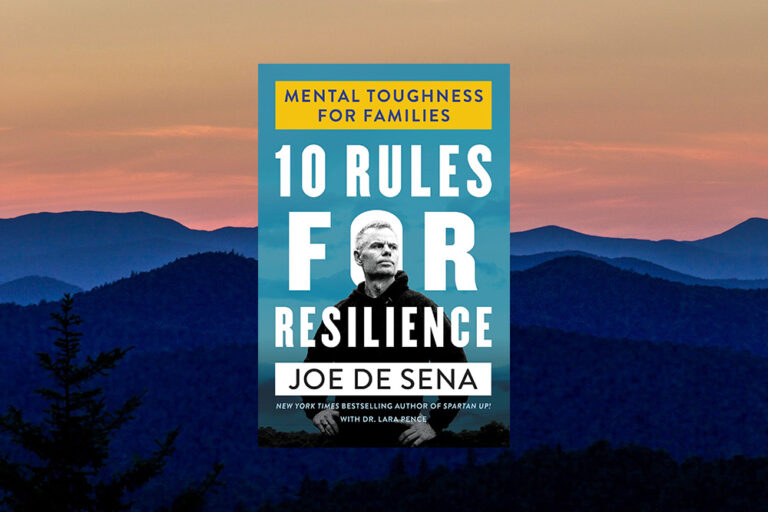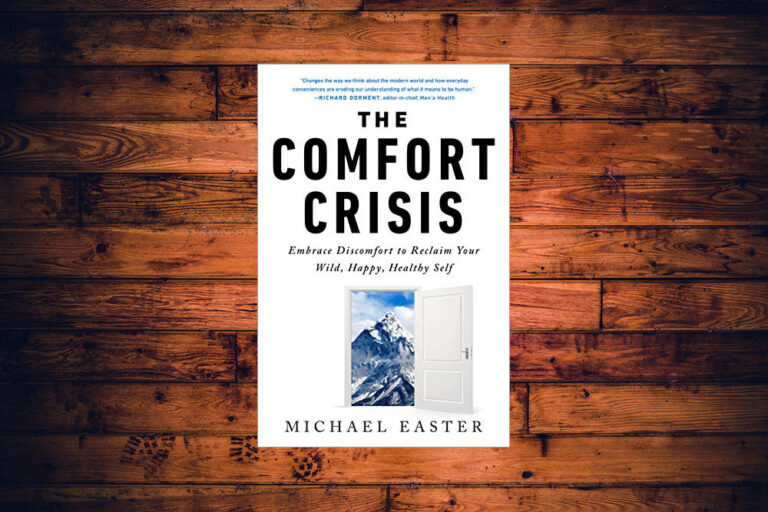#7: Stoic-Inspired Lessons for Mental Fortitude. Lessons on Resilience From Ross Edgley’s “The Art of Resilience” (Part 3)

Ross Edgley needed more than raw strength to complete his epic swim around Great Britain.
He needed something that would help him handle the inevitable pain, doubts, and adverse conditions.
Something that would kick in when his body would be screaming in surrender.
That thing was mental fortitude.
To practice it, he relied on the wisdom of Ancient Greek Stoics.
The three main teachings of Stoicism, defined by Ross, are as follows:
We don’t control and cannot rely on external events, only ourselves and our responses.
Our perception shapes how we see the world around us.
The source of our dissatisfaction lies in our impulsive dependency on our emotionally charged reflexive reactions rather than logic.
Edgley adapted these teachings to create his own philosophy he called Stoic Sports Science. He divided it into having a strong body, a Stoic mind, and a strategic plan. Taken together, they build unbreakable resilience.
Because Ross was so inspired by Stoicism as he pursued his challenge, today’s final article on his book The Art of Resilience: Strategies for an Unbreakable Mind and Body is the longest one.
Let’s go through the lessons he found in this ancient philosophy and how we can apply them to become more resilient.
Becoming a Scholar Athlete
He [Plato] felt that one should balance physical training with ‘cultivating the mind’, exercising ‘the intellect in study’. He wrote, ‘In order for man to succeed in life, God provided him with two means, education and physical activity. Not separately, one for the soul and the other for the body, but for the two together. With these means, man can attain perfection.’ He also said, ‘He who is only an athlete is too crude, too vulgar, too much savage. He who is only a scholar is too soft, too effeminate. The ideal citizen is the scholar athlete, the man of thought and the man of action.’
When you’re working out, eventually your muscles tire and send signals it’s time to stop. But, as David Goggins says, you don’t stop when you’re tired. You stop when you’re done.
And what’s the only way to get things done once your muscles are tired?
Draw strength from the inside.
An old running proverb describes this in the following way:
You run the first half with your legs, the second half with your mind.
Due to the sheer scale of Ross’s challenge, he couldn’t rely on raw strength only. He needed to become the “scholar athlete.” This meant not only training his body but also cultivating resilience to prevent his mind from sabotaging him.
Ross swam 1780 miles (2864 km) and spent 157 days at sea. No matter how athletic he was, the incredible distance ahead of him was always there to mess with his brain. If it weren’t for his personal philosophy, there would be no Great British Swim. The scholar needed to join forces with the athlete to persevere.
Can you imagine the mental pressure of swimming in a cold, dangerous open ocean for the next five months, up to 12 hours every single day?
Many people battle with their minds to go swimming for one hour, let alone 12 hours for 157 days!
Mentally handling such an extraordinary project day after day is as big of an accomplishment as physically managing the never-ending swim.
The mental burdens we carry may be much heavier than the heaviest thing we’ll ever lift physically. That’s why we can’t build our bodies only. Our minds also need constant strengthening.
We might never do anything similar to what Ross did. But it doesn’t mean there’s no lesson we can find here for our everyday lives. The scholar athlete approach to life is valid regardless of the scale of our challenges.
When you’ve finished eleven out of twelve reps of your regular non-Ross-Edgley-style workout, your body may start protesting. If you’ve ever trained hard, you know that physically you’re more than ready to give up. It’s what your body expects. It’s what you yourself would love to do, too.
How do you push through? By understanding that growth lies in pushing your limits. By using your intellect to convince yourself that you aren’t on the brink yet. It may be your legs or arms helping you finish your last rep. But that last rep would have never happened without your intellect. The scholar pushes the athlete to keep going.
This goes beyond fitness, too.
When you’re studying a difficult subject or working creatively, you eventually get tired, too. Your body signals it’s time to give up. But is it really? Or can you push a little longer?
Only your brain can answer this question. And only your brain can help you push forward.
One technique to keep going when struggling is to remind yourself of your past achievements. David Goggins calls it the Cookie Jar method. Each past successful experience of expanding your limits is one more cookie in your mental jar. You reach for a (metaphorical) cookie or two whenever you need a push from within to keep going.
There’s nothing physical about it. It’s the “scholar” part of the equation. You use your intellect to push ahead, not your muscle. And the body listens.
The Importance of Practicing Lessons
Basically, it’s not about learning a lesson, it’s about practising a lesson. How? Well, one of the best ways is through the art of journaling. This is the one shared habit that all the stoics had in common, because although Epictetus was a teacher, Marcus Aurelius an emperor and Seneca a playwright, they all took time to document their daily thoughts, feelings and theories.
Epictetus would constantly remind the students of his school that philosophy was something they should ‘write down day by day,’ and that a written diary was a way they, ‘should exercise themselves’ with constant and continual reflection and self-improvement.
For Seneca, journaling was a more solo endeavour and his favourite time to write was in the evenings when his wife had gone to bed and he was left alone with his own thoughts. He explained to a friend, ‘I examine my entire day and go back over what I’ve done and said, hiding nothing from myself, passing nothing by.’ He would then go to sleep finding that ‘the sleep which follows this self-examination’ was always better.
Ross emphasizes that we shouldn’t merely learn a lesson but practice it. One of the ways to practice philosophy is to journal.
Edgley suggests meditating on the lessons learned during the day and reminding yourself of past teachings from mentors. What’s important is that a journal comes after action, not instead of it. As Ross says, “don’t read it, live it.”
Each day when Ross wasn’t swimming, he journaled about the events of the day from the comfort of the galley. He also discussed philosophy with Matt Knight, the skipper of the support boat who was instrumental in Ross’s success. It may sound like an insignificant pasttime. Yet, Edgley admits it was this regular study of philosophy that helped him get back into water the next day.
Stoicism isn’t a philosophy with hundreds of rules. You don’t need to study thousands of pages to understand it. What’s hard is applying the lessons over and over again. That’s what Ross did through journaling and his conversations.
And that’s what we can do as well to improve ourselves as we face adversity in life.
Self-examination is one of the tenets of Stoicism. Whether you practice this philosophy or follow your own, journaling can help you identify areas where you fail to honor your values. Discussing philosophy with others can also help you identify your blind spots.
How often do you say “I already know that” yet later realize your knowledge doesn’t translate into action?
Repeat the core lessons regularly. It’s easy to fool yourself that since you “know” them, it equals to living them. Yet, there’s a deep chasm between these two.
Lessons on Mental Fortitude From Marcus Aurelius
‘Nothing happens to any man which he is not formed by nature to bear. The same things happen to another person, and either because he does not notice that they have happened, or because he wants to show off his strength of character, he is firm and remains unharmed.’ He basically believed that any challenge could be overcome by a person if they cultivated their fortitude and virtuous nature.
He also believed that unpleasant physical sensations, such as pain, were natural and inevitable in life, but that our conscious mind should not ‘add to the sensation the opinion that it is either good or bad’ as he reminded us of the futility of struggling against suffering that was beyond our direct control: ‘Imagine every man who is grieved at anything or discontented to be like a pig which is sacrificed and kicks and screams.’
On my swim, as I struggled to breathe while wrapped in duct tape, I would constantly remind myself of Marcus Aurelius. A man who ruled an empire, survived wars and plagues and outlived his family.
This is why every time I turned to breathe, I would remind myself, ‘If it’s endurable, then endure it. Stop complaining. If it’s unendurable … then stop complaining. Your destruction will mean its end as well. Just remember: you can endure anything your mind can make endurable, by treating it as in your interest to do so. In your interest, or in your nature.’
One of Ross’s biggest Stoic inspirations was Roman Emperor Marcus Aurelius. Marcus Aurelius’s journals, hundreds of years after his death published as Meditations, became one of the core works espousing the Stoic philosophy.
Suffering his entire life from chronic chest and stomach pains, problems sleeping, and poor appetite, Marcus Aurelius showed unbreakable resilience. One of the emperor’s quotes that most impacted Ross was as follows:
Nothing happens to any man which he is not formed by nature to bear. The same things happen to another person, and either because he does not notice that they have happened, or because he wants to show off his strength of character, he is firm and remains unharmed.
Marcus Aurelius, knowing pain well, accepted it as a natural and inevitable part of life. He didn’t complain about it. Instead, he believed we shouldn’t “add to the sensation the opinion that it is either good or bad.” Or in other words, we shouldn’t judge pain lest we make it even worse than it is.
You can spend your energy judging the pain and making it worse or accepting it and pushing on. As the old quote goes, pain is inevitable but suffering is optional.
This teaching accompanied Ross on a swim during hard moments, for example when he struggled to breathe while wrapped in duct tape that covered his wounds. As he faced pain, Edgley kept telling himself:
If it’s endurable, then endure it. Stop complaining. If it’s unendurable … then stop complaining. Your destruction will mean its end as well. Just remember: you can endure anything your mind can make endurable, by treating it as in your interest to do so. In your interest, or in your nature.
Coping With Uncontrollable Events
Throughout the swim I encountered many uncontrollables. From rogue tides, unpredictable waves and weather, bad family news, unpredictable seals, wild whales and untamed sharks. But it was Marcus Aurelius who said, ‘When you are stressed by an external thing, it’s not the thing itself that troubles you, but only your judgement of it. And you can wipe this out at a moment’s notice.’
He was absolutely right.
When I first heard news of my dad’s illness, I was purely thinking through emotionally charged reflexive reactions rather than logic. The entire situation was being made worst by my judgement of it and it was only because my dad was thinking so rationally that I was able to continue the swim.
Another concept used to cope with uncontrollable events is known as amor fati which is Latin for ‘love of fate’. The exact term can be traced back to the nineteenth-century German philosopher Friedrich Nietzsche who describes it as, ‘My formula for greatness in a human being is amor fati: that one wants nothing to be different, not forward, not backward, not in all eternity. Not merely bear what is necessary, still less conceal it … but love it.’
Basically, do not wish for reality to be any different, rather accept and even love whatever happens. Something Epictetus agreed with over two millennia earlier when he said, ‘Seek not for events to happen as you wish but rather wish for events to happen as they do and your life will go smoothly.’
Stoics later came to call this the ‘art of acquiescence’. This is the act of accepting rather than fighting every little thing as stoics tried to cultivate acceptance to whatever happened to them. ‘If this is the will of Nature then so be it.’ Most events happen without you having a say in the matter. You can either enjoy and love whatever happens, or you get dragged along anyway.
This is why Seneca said, ‘Fate leads the willing, and drags along the reluctant.’
At first glance, it’s tempting to discount Stoicism as a philosophy of the weak. After all, they suggest acceptance over fighting and fate over making things happen. But when you dig deeper, you realize that they don’t praise resignation.
Marcus Aurelius was a respected emperor. Epictetus, quoted above, despite being born into slavery, later in life founded a school of philosophy. Seneca the Younger, another famous Stoic, was an admired statesman and a sage. The works of all three are still influential to this day.
None of those men surrendered to the status quo. But they knew when they faced things they couldn’t control (“fate”). More importantly, they didn’t make their circumstances worse by protesting against them.
Marcus Aurelius accepted his ill health. Epictetus accepted his slavery. Seneca the Younger, in the most striking demonstration of the art of acquiescence, accepted slow and painful death by his own hand when ordered to do so by emperor Nero.
To illustrate this concept in a modern extreme situation, Ross quotes the story of James Stockdale, a prisoner of war in the Vietnam War. Held in the infamous “Hanoi Hilton” for seven and a half years, Stockdale suffered routine torture but was never broken. He credited Epictetus with providing him strength to survive. Here’s the story:
In an interview with Stockdale, business guru and author James C Collins named it the ‘Stockdale Paradox’. Referring to his coping strategy during his period in the Vietnamese POW camp, Stockdale said, ‘I never lost faith in the end of the story, I never doubted not only that I would get out, but also that I would prevail in the end and turn the experience into the defining event of my life, which, in retrospect, I would not trade.’
When Collins asked who didn’t make it out of Vietnam, Stockdale replied, ‘Oh, that’s easy, the optimists. Oh, they were the ones who said, “We’re going to be out by Christmas.” And Christmas would come, and Christmas would go. Then they’d say, “We’re going to be out by Easter.” And Easter would come, and Easter would go. And then Thanksgiving, and then it would be Christmas again. And they died of a broken heart.’
Stockdale then added, ‘This is a very important lesson. You must never confuse faith that you will prevail in the end – which you can never afford to lose – with the discipline to confront the most brutal facts of your current reality, whatever they might be.’
Instead of resorting to naive optimism like the prisoners who perished, Stockdale cultivated equanimity. He never lost the belief that one day he would get out. But it didn’t blind him from the brutal facts of his situation.
Following the Stoic philosophy, he understood that he could focus only on what he could control (his emotions) and that he couldn’t influence what was beyond it (when he would be freed).
As we face challenges in our lives, embracing the same attitude will help us handle them better. Skip judgments and complaints. Focus on what you can do to remedy the situation. And if you can’t do anything, accept it for what it is.
When things are beyond our control, the only sane thing to do is to focus on what we do control. And as Stoics taught, the only thing we can always control is our reaction to what happens.
Questions to Ponder
1. Do you cultivate both physical and mental fortitude?
2. Do you practice your personal philosophy through journaling and exchanging your thoughts with others?
3. When facing pain, do you make it worse by judging it?
4. Do you understand the difference between things we can control and things we can’t? How often do you protest against the uncontrollable?
If you want more advice on how to cultivate mental fortitude, sign up for a free weekly Discomfort Club newsletter. Enter your email address below:





